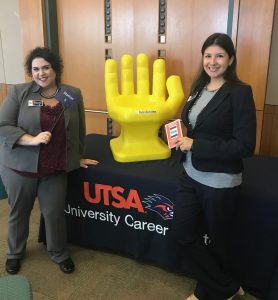
Presenting during the A.S.K. session for CSPD’s internship week
All last week, September 24-27, the Center for Student Professional Development (CSPD) hosted a series of focused events (A.S.K., S.E.E.K, K.N.O.C.K, O.P.EN.) which provided students a plethora of information regarding internships and experiential learning. I enjoyed hearing so much regarding opportunities our students are participating in every year, and their experiences throughout, as well as their outcomes. I want to share a few of the many notes I took while I attended the week long events put on by the CSPD, and hope they will help students with their future goals. The UCC was also asked to share the various benefits of Handshake, during the A.S.K. event. Be on the lookout for our Handshake hand at events coming soon around campus.
Advice from Student Interns:
- Failure is not final – Understanding that not knowing or failing a task/assignment is not final. Students do not know the ins and outs of every process, need to take time asking questions and finding answers from others within the organization, or do the research to get to the right answer.
- Take initiative – While most of the students on a panel agreed it is important to do your work and do it well, they also mentioned being willing to go above and beyond the expectations. Your role as outlined by the organization is important, do that work for sure, but find ways to help and impact those around you. This leaves a favorable impression on other departments and employees within the organization, which can recommend you in the future.
- You are still in the interview – Most of the students felt like they were a part of the team, welcomed by the organization and their colleagues, but cautioned against getting too comfortable. Wearing business casual clothes even when the dress code was more relaxed, helped them stand apart. Not passing on occasions to network, attend sessions or workshops, get in meetings where they could learn more and actively participate, showed their willingness to continue growing and seeking out the next possible job opportunity.
- Travel – Be willing to leave your home, network, support system to head in the direction of opportunity. More internships and growth can happen when you travel (when you “leave the nest”) because it exposes you to other cultures, backgrounds and ideas.
- Utilize your network – There are many professors on campus who have either worked in the same industry or field they teach, or developed very strong connections with those who do. Use that to your advantage by asking them questions, engaging them more is key.
- Keep learning – Some specific experiences included the need to continue building knowledge about their subject matter as well as using research to solve hard problems/projects. Listen to podcasts, read articles, check out books from the library, ask your professors (e-mail is great!), and earn certifications if needed. Always keep moving forward to a next step.
Advice from Employers hiring Interns:
- Start now – Several freshman attended, alongside upperclassmen, and they are just as welcome to come network and be at the table gathering information. While many opportunities lie in the junior/senior year, it is important to already form a plan towards your internship goal. It is important to know what experiences and work can be put in to prepare for junior/senior year internships.
- Travel – Be willing to leave your home, network, support system and head in the direction of opportunity. Several large companies are headquartered out of state, all over the country, and provide opportunities at those locations. Some require trainings elsewhere and actual job duties take you across state lines. Come to the conclusion you can “leave the nest!”
- Join a student organization – Many companies see experience with leadership, problem solving, conflict resolution, time management and teamwork/collaboration brought out through joining a club, society, fraternity, sorority or other outside group.
- Use your capstone – When you begin your project, understand it should prepare you for the real world. Look to apply it in the work world. Yet another place to rely on and build closely with your professors.
- Speak up – Ask questions of recruiters and interviewers, which is what they are there for!
- Accept Feedback – Various staff and other company members may give you some advice, work on correcting your figures or reports and send you back to the drawing board. It is not to make you feel bad, it’s to help you grow. Take the constructive criticism or advice they share and do it better next time.
- Impressions – Work towards an overall internship goal of “Will they miss me when I leave?”